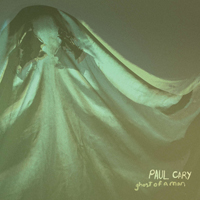Every Thursday, Pop Addict presents infectious tunes from contemporary musicians across indie rock, pop, folk, electronica, and more.
 Paul Cary: “The Curse of China Bull” (Ghost of a Man, available for free at Candy Dinner)
Paul Cary: “The Curse of China Bull” (Ghost of a Man, available for free at Candy Dinner)
[audio:https://alarm-magazine.com/wp-content/uploads/2010/12/Paul_Cary_The_Curse_of_China_Bull.mp3|titles=Paul Cary: “The Curse of China Bull”]
Music, like any form of art, is at its best when it is evolving, transforming, and shifting the way that we think about a certain style or genre, altering our perception of what constitutes good music. Only by looking forward can we free ourselves from resuscitating the same old thing.
However, an album like Ghost of a Man, the latest effort from Chicago-based rocker Paul Cary, is enough to turn that notion on its head. Ghost finds Cary looking back, evoking bluesy backwoods foot-stompers with rough edges and sharp teeth. He’s not simply regurgitating. Cary’s howling voice and raw guitar playing puts a modern twist on the genres he’s exploring, giving them a fresh start.
This notion of “looking back as a way of looking forward” isn’t new. Think of The Strokes or The Darkness or any multitude of indie-synth bands that are just rediscovering ’80s dance pop. And bands like Fleet Foxes have rediscovered mountain-ridge folk music, while The Black Keys have revived the blues with a rock ’n’ roll twist.
Paul Cary also fits into this notion. Ghost of a Man includes a multitude of past influences, from homegrown folk rock to gritty blues to 1950s pool-hall rockabilly. And though all of these musical styles have been around for decades — and perfected for nearly as long — Cary is somehow able to breathe new life into these genres, offering an album poised with lesson-learned experiences and nothing-to-lose boldness that much of indie music is void of today.
But Cary’s swagger and musical know-how should come as no surprise to those who are familiar with him. As the former frontman of The Horrors, Cary has made a name for himself as a solid craftsmen of raw, rough-hewn Midwestern punk rock. But whereas The Horrors dabbled with more frenzied garage sounds, Cary’s solo effort on Ghost of a Man finds him taking a step back from the chaos, with a feel of confidence hovering over his cool and collected arrangements. He feels instantly older, more experienced, and more knowledgeable — though jaded. Most importantly, there is intelligence and sophistication to his songs, proving firsthand that things improve with age.
Cary, however, has not lost his edge. On the contrary, the album opens with the low-fi, countrified “The Curse of China Bull,” and immediately the listener hears a man who knows what he’s doing. He’s been lied to, even by himself, and he’s fed up. Listening to the track, you get a complete Rebel Without a Cause feel, as if Cary spent some time back in the ’50s, smoking Lucky Strikes and drag racing on the weekends.
As a self-proclaimed “old soul,” Cary is not trying to fool anyone with this album. As a gifted guitarsmith and songcrafter, he knows what he does and does it well. His straightforward transistor-radio jingles let you know what you’re in for from the get-go. From the punk-swing “Yes Machine” to the grainy blues-rock “On the Rise” to the boozy, spooky title track, Cary paints an all-too-vivid picture of a hard, cruel world, with things going from rough to bleak to despairing at times.
But Cary sounds wise beyond his years, mixing old-school blues/country riffs and melodies that instantly attach themselves to memory. The album sounds as though it could serve as the soundtrack of a Bildungsroman film, with each track dripping with themes of new experiences, rebellion, disappointment, and getting on and bearing it. Moreover, Ghost of a Man’s haunting vocals, crude guitar work, dirty swing drums, and gloomy arrangements suggest that Cary is perfectly fine going against the grain — that is, looking backwards — and seeing what he can discover.
“Angel From Heaven” finds Cary contemplating calling a beautiful girl “ugly” in order to get her attention; or that “bad people make the world go round” on the aptly titled “Bad People”; or that he’s lonely because the only love for him is “true.” These juxtapositions are constant throughout the album, lending themselves as one of Cary’s most interesting and most endearing qualities. And contradiction after contradiction lends itself to a common theme of disenchantment as Cary is intent on exploring life’s pitfalls and disillusionments.
The upside, though, is that despite these disenchantments with life’s misgivings, there is something to take away from all of this. Cary has found his voice. He has been able to reinvent himself as an artist, and because of it, he rises older, wiser, and a better artist for it. From the darkest depths of Ghost of a Man, achievement emanates.


Amazing album, does anyone know where I can find the lyrics? I searched everywhere, I would like to know what he`s singing.